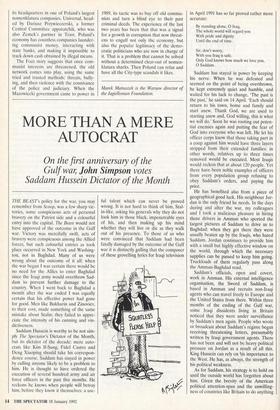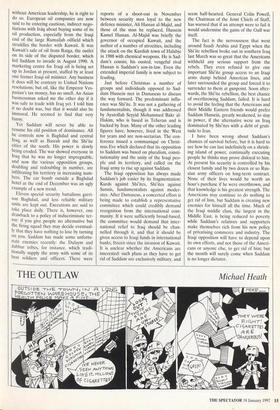MORE THAN A MERE AUTOCRAT
On the first anniversary of the Saddam Hussein Dictator of the Month
THE BEASTs policy for the war, you may remember from Scoop, was a few sharp vic- tories, some conspicuous acts of personal bravery on the Patriot side and a colourful entry into the capital. The Beast would not have approved of the outcome in the Gulf war. Victory was mercifully swift, acts of bravery were conspicuous among the Allied forces, but such colourful entries as took place occurred in New York and Washing- ton, not in Baghdad. Many of us were wrong about the outcome of it all: when the war began I was certain there would be no need for the Allies to enter Baghdad since the Iraqi army would overthrow Sad- dam to prevent further damage to the country. When I went back to Baghdad a month after the war ended I was equally certain that his effective power had gone for good. Men like Bukharin and Zinoviev, to their cost, made something of the same mistake about Stalin; they failed to appre- ciate the intensity of his cunning and vin- dictiveness.
Saddam Hussein is worthy to be not sim- ply The Spectator's Dictator of the Month, but its dictator of the decade: mere auto- crats like Kim II-Sung, Fidel Castro and Deng Xiaoping should take his correspon- dence course. Saddam has stayed in power by culling anyone likely to be a problem to him. He is thought to have ordered the execution of several hundred army and air force officers in the past five months. He reckons he knows when people will betray him, before they know it themselves: a use-
ful talent which can never be proved wrong. It is not hard to think of him, Stal- in-like, asking his generals why they do not look him in those black, impenetrable eyes of his, and then making up his mind whether they will live or die as they walk out of his presence. To those of us who were convinced that Saddam had been fatally damaged by the outcome of the Gulf war it is distinctly galling that the composer of these grovelling lyrics for Iraqi television in April 1991 has so far proved rather more accurate:
By standing alone, 0 Iraq, The whole world will regard you With pride and dignity Until the end of time.
Sir, don't worry, With you Iraq is safe.
Only God knows how much we love you, O Saddam.
Saddam has stayed in power by keeping his nerve. When he was defeated and seemed on the point of being overthrown, he kept extremely quiet and humble, and waited for his luck to change. 'The past is the past,' he said on 14 April. 'Each should return to his town, home and family and start anew. Thank God, we are used to starting anew and, God willing, this is what we will do.' Soon he was rooting out poten- tial enemies again and putting the fear of God into everyone who was left. He let his officer corps know that those taking part in a coup against him would have three layers stripped from their extended families: in other words, relatives up to three times removed would be executed. Most Iraqis would reckon that at about 120 people. Yet there have been noble examples of officers from every population group refusing to obey Saddam's orders, and paying the price.
He has benefited also from a piece of geographical good luck. His neighbour Jor- dan is the only friend he needs. In the days during and after the war, my colleagues and I took a malicious pleasure in hiring those drivers in Amman who sported the largest pictures of Saddam to drive us to Baghdad: when they got there they were usually beaten up by the Iraqis, who hated Saddam. Jordan continues to provide him with a small but highly effective window on the world, through which the necessary supplies can be passed to keep him going. Truckloads of them regularly pass along the Amman-Baghdad road.
Saddam's officials, open and covert, work in Amman. His external intelligence organisation, the Sword of Saddam, is based in Amman and recruits non-Iraqi agents who can travel freely to Europe and the United States from there. Within three months of the ending of the Gulf war, some Iraqi dissidents living in Britain noticed that they were under surveillance by Saddam's men again. People who wrote or broadcast about Saddam's regime began receiving threatening letters, presumably written by Iraqi government agents. There has not been and will not be heavy political pressure on Jordan as a result of all this. King Hussein can rely on his importance to the West. He has, as always, the strength of his political weakness.
As for Saddam, his strategy is to hold on until the outside world has forgotten about him. Given the brevity of the American political attention-span and the unwilling- ness of countries like Britain to do anything without American leadership, he is right to do so. European oil companies are now said to be entering cautious, indirect nego- tiations with Irk' about buying some of its oil production, especially from the Iraqi end of the large Rumailah oilfield which straddles the border with Kuwait. It was Kuwait's sale of oil from Ratga, the outlet on its side of the disputed border, which led Saddam to invade in August 1990. A marketing centre for Iraqi oil is being set up in Jordan at present, staffed by at least one former Iraqi oil minister. Any business it does will be contrary to United Nations resolutions; but oil, like the Emperor Ves- pasian's tax money, has no smell. An Asian businessman asked me the other day if it was safe to trade with Iraq yet. I told him it no doubt was, but that it would also be immoral. He seemed to find that very funny.
Yet Saddam will never be able to resume his old position of dominance. All he controls now is Baghdad and central Iraq, as well as Basrah and the Shi'ite cities of the south. His power is slowly being eroded. The war showed everyone in Iraq that he was no longer impregnable, and now the various opposition groups, doubling and redoubling in number, are infiltrating his territory in increasing num- bers. The car bomb outside a Baghdad hotel at the end of December was an ugly example of a new trend.
Eleven special security battalions garri- son Baghdad, and less reliable military units are kept out. Executions are said to take place daily. There is, however, one drawback to a policy of indiscriminate ter- ror: if you give people no alternative but the firing squad they may decide eventual- ly that they have nothing to lose by turning On you. Saddam has made some unfortu- nate enemies recently: the Dulaym and Jubbur tribes, for instance, which tradi- tionally supply the army with some of its best soldiers and officers. There were reports of a shoot-out in November between security men loyal to the new defence minister, Ali Hassan al-Majid, and those of the man he replaced, Hussein Kamel Hassan. Al-Majid was briefly the governor of occupied Kuwait, and the author of a number of atrocities, including the attack on the Kurdish town of Halabje in 1988 with chemical weapons. He is Sad- dam's cousin; his ousted, vengeful rival Hassan is Saddam's son-in-law. Even the extended imperial family is now subject to feuding.
Just before Christmas a number of groups and individuals opposed to Sad- dam Hussein met in Damascus to discuss the way forward. The predominant influ- ence was Shi'ite. It was not a gathering of fundamentalists, though it was addressed by Ayatollah Seyyid Mohammed Bakr al- Hakim, who is based in Teheran and is backed by Iran. Many of the other leading figures have, however, lived in the West for years and are non-sectarian. The con- ference issued a communiqué on Christ- mas Eve which declared that its opposition to Saddam was based on pluralism, consti- tutionality and the unity of the Iraqi peo- ple and its territory, and called on the Iraqi army to rise up against Saddam.
The Iraqi opposition has always made Saddam's job easier by its fragmentation: Kurds against Shi'ites, Shi'ites against Sunnis, fundamentalists against moder- ates. After Damascus, a concerted effort is being made to establish a representative committee which could credibly demand recognition from the international com- munity. If it were sufficiently broad-based, the committee would demand that inter- national relief to Iraq should be chan- nelled through it, and that it should be given access to Iraqi funds in international banks, frozen since the invasion of Kuwait. It is unclear whether the Americans are interested: such plans as they have to get rid of Saddam are exclusively military, and seem half-hearted. General Colin Powell, the Chairman of the Joint Chiefs of Staff, has warned that if an attempt were to fail it would undermine the gains of the Gulf war itself.
The fact is the nervousness that went around Saudi Arabia and Egypt when the Shi'ite rebellion broke out in southern Iraq last March was so great that the Americans withheld any serious support from the rebels. They even refused to give one important Shi'ite group access to an Iraqi arms dump behind American lines, and later surrounded the group and forced it to surrender to them at gunpoint. Soon after- wards, the Shi'ite rebellion, the best chance of overthrowing Saddam, failed. It is hard to avoid the feeling that the Americans and their Middle Eastern friends would prefer Saddam Hussein, greatly weakened, to stay in power, if the alternative were an Iraq dominated by Shi'ites with a debt of grati- tude to Iran.
I have been wrong about Saddam's chances of survival before, but it is hard to see how he can last indefinitely on a shrink- ing island of power, continually executing people he thinks may prove disloyal to him. At present his security is controlled by his closest family and by two dozen or so Rus- sian army officers on long-term contract. None of their lives would be worth an hour's purchase if he were overthrown, and that knowledge is his greatest strength. The Americans may continue to do nothing to get rid of him, but Saddam is creating new enemies for himself all the time. Much of the Iraqi middle class, the largest in the Middle East, is being reduced to poverty while Saddam's relatives and supporters make themselves rich from his new policy of privatising commerce and industry. The Iraqi opposition will have to depend upon its own efforts, and not those of the Ameri- cans or anyone else, to get rid of him; but the month will surely come when Saddam is no longer dictator.



















































 Previous page
Previous page